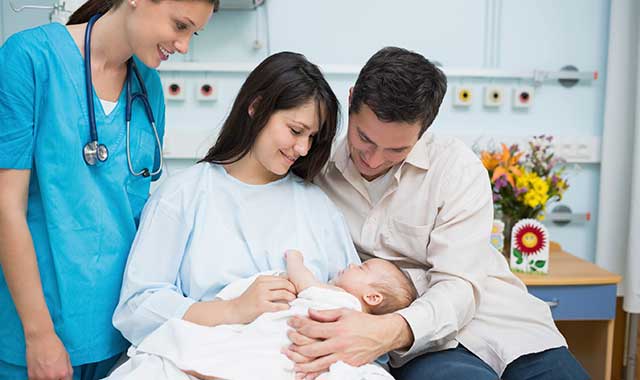Successfully delivering a newborn takes a lot of patience and care. Meet some of the passionate health professionals who share the excitement of birth with new mothers and fathers.

If you’re planning to have a baby, are already pregnant, or know someone who’s pregnant, this is an exciting time in life.
No matter what stage they’re in, expecting mothers and their families have a lot to learn, to ensure that both mother and baby arrive safely at their destination.
Knowing what to anticipate as each 12-week trimester passes, along with laying a strong foundation of healthy habits, will help expecting mothers to avoid obstacles and breakdowns along the way.
Before You Conceive
Before getting pregnant, women should talk to their doctors about preconception health care, health history and any medical conditions they have that could affect pregnancy.
Statistically speaking, only about half of women who become pregnant do so intentionally.
According to the federal Centers for Disease Control and Prevention (CDC) a woman who unexpectedly becomes pregnant run a higher risk of complications to both. Some expectant mothers may not be in the best of health to begin with, and they may also delay seeing a gynecologist for weeks or months.
“Every single aspect of a woman’s health can impact her during the pregnancy, and it can affect her unborn child,” says Dr. Vneshe Parekh, a board-certified family medicine practitioner at Presence Saint Joseph Hospital in Elgin.
When a woman discusses potential pregnancies with her physician, it’s important to discuss her personal history of past pregnancies, family history of miscarriages and other problems, and whether or not she has been exposed to, or is being treated for, sexually transmitted diseases. Other health concerns including the potential for diabetes, should be discussed.
Because a baby’s brain, heart, kidneys and lungs form during the first eight weeks of pregnancy, high blood glucose levels are especially harmful during this early stage, according to the National Diabetes Information Clearinghouse (NDIC).
Yet, many women don’t realize they’re pregnant until five or six weeks after conception. Worse, a large number of young women in their childbearing years aren’t even aware that they’re diabetic. To protect the baby’s health, mothers-to-be need to work closely with their health care team to be tested and to get blood glucose levels under control – before they get pregnant.
“Even women who are not diabetic can become so when they conceive,” Parekh says. “This is called ‘gestational diabetes,’ and it can occur in the later stages of pregnancy.”
The NDIC reports that gestational diabetes is normally treated with diet, exercise and, if necessary, insulin.
Other health concerns may also impact an expectant mother.
“Women need to know if they have thyroid disease and to ensure it is properly medicated before they conceive,” Parekh says. “Uncontrolled thyroid disease has been linked to miscarriage.”
Parehk also points out that a woman must have her blood pressure monitored and under control, by the time she decides to have a child. Blood pressure will continue to be monitored during pregnancy, for signs of preeclampsia.
Preeclampsia is a pregnancy complication characterized by high blood pressure and damage to the mother’s organs, quite often her kidneys. It usually manifests after 20 weeks of pregnancy in women whose blood pressure has been normal up to that point. Blood pressure monitoring at regular gynecological appointments is vital to detection.
“Left untreated, preeclampsia can lead to serious, even fatal, complications to both mother and child,” Parekh warns. “The only cure is induced premature delivery.”
When preeclampsia is diagnosed too early in pregnancy to safely deliver the baby, the mother’s medical team first considers alternate treatments, such as addressing the mother’s blood pressure and preventing possible seizures, according to the Mayo Clinic.
Future mothers also benefit from breaking bad habits such as smoking, drinking alcohol to excess, taking “street” drugs and other detrimental activities, including eating disorders such as bulimia and anorexia. Taking certain medicines during pregnancy can cause serious birth defects. These include some prescription and over-the-counter medications as well as dietary or herbal supplements. Some vaccines, however, are acceptable.
“Pregnant women can safely have inactivated influenza vaccine,” Parekh says.
In addition to a nutritionally balanced diet, Parehk says, pregnant women should take 400 micrograms of folic acid every day, starting before conception, to help prevent birth defects in the infant’s brain and spine.
And finally, the NCID recommends that mothers and their doctors watch for any signs of mental distress. Women who are carrying a child need to feel good about themselves, their lives and the future. Anxiety, worry, stress and depression not only rob the woman of the joy of becoming a mother – they can also harm her physically. This is especially true during the final trimester, when anticipation of the baby’s arrival can be overshadowed by fears and overwhelmed by doubt. Mothers-to-be need the constant, reassuring support and watchfulness of their families, friends and coworkers to recognize and prevent any pre-natal nervous tension or postpartum depression.
Cancer and Maternity
Many complications are directly connected to pregnancy and delivery, but some mothers-to-be have even more potentially serious health conditions to worry about, such as cancer, says Dr. Chilakamarri Yeshwant, board-certified medical oncologist/hematologist at Advocate Sherman Hospital in Elgin. Between four and eight gynecologic malignancies occur in 100,000 pregnancies – less than one-tenth of 1 percent of all pregnancies in the U.S.
“We do see cases of cervical, uterine, ovarian and breast cancers, and Hodgkin’s lymphoma diagnosed in women who are pregnant,” Yeshwant says. “When this happens, it certainly complicates matters, but it still can be treated.”
Hodgkin’s lymphoma is a cancerous malignancy that involves lymph nodes located throughout the woman’s body. Hodgkin’s is most commonly diagnosed in early adulthood, in women between the ages of 15 and 40, but most often found when the woman is in her 20s, the prime childbearing years. Yeshwant has seen Hodgkin’s lymphoma, ovarian cancer and breast cancer diagnosed in women as young as 19.
Cancer treatment options for pregnant women depend on several factors, according to the American Cancer Society. The patient and her physicians must consider the type of cancer, the extent and location of the cancer, how quickly it’s growing, how far along the pregnancy is, and the woman’s personal preferences for how to proceed.
“We are somewhat limited during the first trimester of the pregnancy because that is when the fetus is growing fastest and is most vulnerable,” Yeshwant explains. “We cannot perform CT scans of the chest or abdomen, but we can safely do MRIs and ultrasound examinations, as well as biopsy or surgery, to make a diagnosis and to determine the extent of the tumor. Once we have a clear picture of where and how large the tumor is, we will know how best to treat it.”
After the first trimester has passed, most women and fetuses can tolerate chemotherapy, if needed, Yeshwant says. Still, extreme care must be taken because chemotherapy introduces toxic drugs into the pregnant mother’s body. And, Yeshwant adds, the treatment usually is stopped about three to four weeks prior to the delivery date, or after 35 weeks of pregnancy, to reduce complications. Certain chemotherapy drugs are altogether avoided.
“For example, breast cancer treatment does not affect pregnancy, but it becomes a more complicated matter,” Yeshwant says. “Surgical removal of the tumor is possible during pregnancy, with chemotherapy after the first trimester.”
Radiation is not given during pregnancy because of concerns about the possible long-term effects on the unborn.
“Most times, we can treat the patient with other modalities and use radiation therapy after delivery,” Yeshwant says.
For non-pregnant patients who have already been diagnosed with some form of cancer, oncologists usually recommend waiting on future pregnancies for two to five years after completion of treatment. But, this decision is very individual and fertility specialists can help patients to make the right choices. Yeshwant says breastfeeding is possible, even in cases of breast cancer, so long as active treatments are completed.
“Precautions then need to be taken so we can buy time for both the mother and baby,” he says. “In each case, the treatment plan is tailor-made in consultation with other specialists, and the patient and her family. Communication and education are of prime importance. ”
The Final Stretch
As the time nears for the baby’s arrival, it’s important to continue eating regular, well-balanced meals and drinking at least eight to 10 glasses of water a day, says Jennifer Franz, a labor and delivery nurse at Northwest Community Hospital in Arlington Heights.
“The best piece of advice is to listen to your body and do what feels right to you at the time,” Franz says. “Don’t be afraid to speak up to your health care provider if something doesn’t feel right to you, or if you have concerns. As difficult as it may seem, try not to stress about when your labor will begin. Enjoy the end of your pregnancy and use that time to prepare for the new baby coming into your world.”
Franz recommends that patients head to the hospital when they have regular, persistent contractions that grow stronger in intensity.
“If you have to pause and stop talking through the contractions, or you feel as though you are ready to request pain medications, then that is a good indication that it’s time to head to the hospital,” Franz says. “If your water breaks or you note any abnormal bleeding, that would also be a sign it’s time to go in.”
Every pregnancy is different. What is normal to one patient may be abnormal to another.
“Trust your mother’s intuition,” Franz says. “If something doesn’t feel right to you, let your doctor know. It may be significant enough to necessitate hospital assessment and treatment.”
Upon arrival at Northwest Community Hospital’s labor and delivery department, the mother-to-be will be greeted by the staff and shown to a triage room.
“There, a nurse will do a full assessment and ask admission questions,” Franz says. “She will discuss your status with your doctor, whether he or she is present or away from the hospital. Once active labor is confirmed, you will be moved to a laboring room. Your doctor and nurse will work with you to have a safe delivery focused around family-centered care.”
Asked what expectant mothers should bring with them, Franz explains that every patient packs differently for the hospital, based on what makes her comfortable.
“I would say the necessities are a camera, baby book, a phone charger, snacks for your support system, toiletries, comfortable clothes for postpartum and an outfit for your baby to go home with,” she says.
Even with a healthy gestation period, labor and delivery can bring surprises.
“The single most important advice I can give is to expect the unexpected,” Franz says. “Whether this is your first pregnancy or your fifth, no amount of planning or preparation can accurately dictate your labor and delivery experience. Your baby may have a different plan than you, but our goal is always to have a healthy mom and healthy baby.”
In Good Hands
Pregnancy is a joyful and sometimes stressful process that brings many rewards in the end. The vast majority of women and babies make it through pregnancy and delivery without any serious issues, but pregnancy isn’t foolproof. Complications can arise that threaten mother and child. Even so, American parents will welcome about 450,000 successfully delivered newborns this year.
So, if you’re ready to start a family or are already on your way toward parenthood, program that GPS (good pregnancy smarts), pack up your common sense and intuition and follow your doctor’s directions. The newest addition to your family will arrive safely in no time at all.



















































